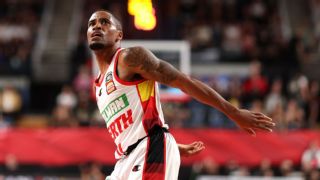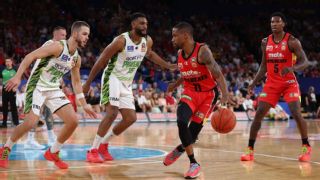|
It makes sense that Bryce Cotton's fourth NBL Most Valuable Player award felt that little bit more special than the rest. Sure, we have the fact that he's now won the Andrew Gaze Trophy more times than anyone outside the award's namesake. There's also something special about winning it as the league's scoring champion -- the seventh time he's led the NBL in points per game -- on a team that finished in the top-two. So, asked if there was something different about the 2023-24 award, Cotton didn't hesitate: "Yes," he told ESPN. "Extremely special... not only was I able to turn it around and play at a level that I probably never reached in the NBL before... I just think the combination of how everything came together; it's very special. It would sit next to probably my third MVP, as being my favourite one." That turnaround, of which Cotton speaks, was a profound one. The first seven games of the Wildcats' season, while seeming like a distant memory now, was extremely worrisome for both Cotton and the team. Cotton averaged just 14.4 points per game over that stretch -- good for 23rd in the league -- while shooting 29 percent from the field and 25 percent from downtown, on a team that was 2-5. Things were grim, until Cotton started to look like his old self again. The rotations were tweaked and schemes implemented to better maximise Cotton, which turned the season in the Wildcats' favour. They would end up finishing the regular season in second place with a 17-11 record, with Cotton running away with the league's scoring title, averaging 23.1 points a game.  That set of circumstances -- the initial struggles, before the rise -- was a reminder of a few things. The first is just how good Cotton is, and the gravity he creates both on the court and within the consciousness of the entire league. The other is just how valuable Cotton is to the Wildcats; where there's really clear, unambiguous, causal line between his individual effectiveness and the team's success. It's what made crowning him the league's Most Valuable Player -- again -- an easy task for those who voted. The value, however you want to define it, was demonstrable. It then begs the question: what's the most valuable quality of the league's Most Valuable Player? "Competitiveness," Cotton's head coach, John Rillie, told ESPN, succinct as usual, before being asked to expand. "That's the best thing about him. What allows him to be a superstar, successful player is his competitiveness. "How does that get shown? That shows up in practice, in any drill. I run practices where pretty much everything is a competitive drill. That shows up in the off-season when we're doing workouts, and he has a specific goal that he does. If he's not achieving that goal, we're not moving on to the next thing. He is striving for excellence in everything he does; if he doesn't reach that point, he's repeating it until he gets to the level where he's feeling like it's excellent. I'm sure you've been in gyms where it's like 'let's make nine out of 10', and it's really hard, and there's a point where they just go: I'll get to that tomorrow. "There's no 'getting to it tomorrow' with Bryce Cotton. We are fixing the problem right now and getting it done." That's an attribute that sounds basic, or should be a given, but can be a rarity in the NBL. Star players around the league sit out practices, or drills, or obligations all the time; it's the sort of thing that can often create resentment within a group. Given the load Cotton carries over the course of a season -- he led the league in minutes per game, at 37:31; the most in his NBL career -- one wouldn't blame him if he decided to sit out practices, or preserve his body in non-game situations. He doesn't, and it's garnered the 31-year-old a heap of respect among his teammates. "I've always been against him and been like, sure, he's really good," Wildcats forward Hyrum Harris told ESPN.  "But, it's not just showing up for a game and being good; he trains hard, and he'll only ever sub if someone asks him to sub. He's always practicing, he's always ready to go. That's one thing I really appreciate. You're the best player in the league, and maybe the history of the NBL, but he doesn't take days off. He doesn't relax. He works just as hard, if not harder, than your average basketball player." This isn't new, either. Damian Martin, who Cotton won three championships alongside, remembers the effort his former teammate put into everything he did. "We're wearing the heart rate monitors," Martin tells ESPN. "At any point, a player got into what they call 'the red zone', the coaches would sub them out because you have a high risk of injury when you're in the red zone. "Bryce was the only one they allowed, every single day, to get into that red zone, because they know that's where he plays during a game, and his body is capable or playing at that level for a long period of time without hurting himself." Cotton was asked the same question: what's the most valuable part of you? Somewhat stunned, he asked for the question to be repeated. It was. He took a beat. "Man... that's a good question," Cotton said. "If I had to pick something, I would just say it's the heart that I play with. "Whether I'm playing good in a game, whether I'm playing okay, whether it's a tough game for me, I'm gonna give it everything I've got. The game is not over, in my mind, until it's over. I think I've shown that heart a lot of times throughout my career."
|
